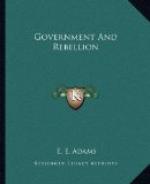Our revolution of ’76, and onward, was not a rebellion; it was resistance of oppression, of burdensome taxation without equal representation, and it resulted in our distinct nationality.
The revolutions of France have been of a similar character; they have sprung from oppression of the most severe and unnatural kind. This was the fact, at least, in 1797 and in 1830. In 1848, when it was my lot to be in the midst of it, the revolution arose from the selfish conduct of Louis Philippe, who enriched himself and his family out of the national treasury, and encouraged his sons in a course which was at war with national precedent, with the commercial interests and democratic individualism of the French; for with their imperial prestiges and tastes they are extreme in their personal democracy.
But all these revolutions resulted in good to the people. Education, public spirit, enterprise, labor, all the arts of civilization, and even evangelical Christianity received a new impulse. Mind was opened and enlarged; the people thought for themselves, and sighed for knowledge and a better faith.
Revolution is going on silently, from year to year, in England. The nobility yield by slow, almost imperceptible degrees, to the demands of the people. It is by this process that the Government avoids the shocks which startle Austria, France and Italy.
Such is the variety of honest opinion among men on all subjects; so different are the degrees of information, and the opportunities of judging with regard to the best measures of government; such a diversity exists in the interests and abilities of a people,—that they may be good citizens without being satisfied altogether with the constitution, or with those who administer its laws. There will be different political parties. It is the glory of a government that the people are allowed to think and vote as they please, and to express their honest opinions. Perhaps with us, expression is too free, especially in regard to public men and measures. We may have diverse views and convictions, and yet feel and act loyally. But men who endeavor by any influence or means to lessen the loyalty of others, to alienate the love of the people from the government, and who signify their own aversion, not by condemning a single statute and seeking its lawful repeal, but by heaping abuse on the constitution and on those who are chosen to administer the laws, by avowing their hostility to the government and its policy, or their purpose to resist and war against it,—are in a posture of rebellion. Those who, being in office, commanding the arms and other property of the government, cause them to be removed so as to weaken its power and strengthen those in actual rebellion, or who are threatening the same; those who aid and comfort a population or soldiery who are in a state of actual resistance, and finally, those who do openly and avowedly renounce the authority of the government to which they have sworn allegiance, or take up arms to attack its strongholds, seize or destroy its property, or injure the soldiers and citizens who are sent to protect it,—are in a state of rebellion against its laws and against the commonwealth over which it holds the shield of its authority.




